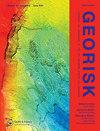聚焦文章“城市环境中的洪水危害”
IF 4.8
3区 工程技术
Q1 ENGINEERING, GEOLOGICAL
Georisk-Assessment and Management of Risk for Engineered Systems and Geohazards
Pub Date : 2023-04-03
DOI:10.1080/17499518.2023.2217034
引用次数: 0
摘要
乔治克于2013年推出了“聚焦”系列节目。该系列的目的是邀请杰出的学者和实践者回顾一个重要的主题,突出研究空白,并提出富有成效的研究方向。《Georisk》第17卷第2期(2023年)将为您呈现由高亮、张利民、洪杨、陈鸿欣和冯世进五位杰出研究人员撰写的“城市环境中的洪水灾害”专题文章。高教授现为澳门大学智慧城市物联网国家重点实验室及科技学院助理教授。她的研究重点是开发模拟水相关灾害的数值方法,并将遥感技术与数值模型相结合。她的研究得到了几家资助机构的支持。她还在Georisk的编辑委员会任职。张教授现任香港科技大学土木及环境工程学系系主任及讲座教授。他也是岩土工程离心机设施主任和GREAT智能城市研究所副主任。张教授是Georisk的主编。他获得了美国土木工程师协会(ASCE)颁发的2023年Ralph B. Peck奖。洪教授是美国国家海洋和大气管理局/国家气象中心和俄克拉荷马大学的讲座教授。他的研究兴趣包括水文模型,水资源管理,雷达和卫星遥感检索/验证/应用,以及用于改善气候变化下灾害预测的数据同化系统。洪博士发表了350多篇论文、书籍和书籍章节,被引用次数超过23000次。陈教授为同济大学岩土工程系副教授。主要研究方向为地球环境工程和自然灾害数值模拟。他是《自然灾害评论》和《智能建筑杂志》的副主编。冯教授现任同济大学岩土工程系讲座教授。主要研究方向为地球环境工程和土壤动力学。“973计划”青年首席科学家、国家杰出青年科学基金获得者、上海市科学技术进步一等奖获得者。有效的城市洪水风险管理需要准确的洪水淹没程度估计和快速的信息交换。城市环境的特点是人为变化,不透水的土地覆盖,人工地表和地下排水系统,人口密集的建筑群。因此,城市洪涝灾害分析更具挑战性。本文对城市环境洪水灾害评价的基本理论、主要城市环境因子、建模方法和不确定性进行了综述。它首先从多学科的角度回顾了城市洪水的知识状况,然后介绍了基于物理的建模方法和城市环境因素。城市暴雨水流的数值模拟已成为一种标准做法。结合地表径流和管道流量的建模能力对于预测城市洪水灾害和呈现时空分析结果至关重要。城市环境因素,如建筑物分布、不透水地表表现、地表流和排水网络流的整合,必须在危害评估中得到适当的体现。水力建模过程中的不确定性主要来源于输入数据、模型参数、模型结构和验证过程。当一个水力模型被校准并应用于预测时,不确定性也来自校准参数的可变性、验证算法、假设和分析模型的局限性。在理解过程相关指标方面有希望的进展依赖于改进的测量技术和物理模型的发展。数据丰富的环境鼓励开发新模型和新见解。作者认为,在城市环境中评价暴雨引发的洪涝灾害是一个多方面的问题本文章由计算机程序翻译,如有差异,请以英文原文为准。
Spotlight article “Flood hazards in urban environment”
Georisk launched the “Spotlight” series in 2013. The purpose of this series is to invite distinguished scholars and practitioners to review an important topic, to highlight research gaps and to suggest fruitful research directions. Volume 17, Issue 2 (2023) of Georisk is pleased to present a Spotlight Article on “Flood hazards in urban environment” by five prominent researchers in the field, Liang Gao, Limin Zhang, Yang Hong, Hongxin Chen and Shijin Feng. Prof. Gao is an assistant professor at the State Key Laboratory of Internet of Things for Smart City and Faculty of Science and Technology, University of Macau, Macao, China. Her research focuses on developing numerical methods for simulating water-related hazards and integrating remote sensing techniques with numerical models. Her research has been supported by several funding agencies. She also serves on the Editorial Board of Georisk. Prof. Zhang is Head and Chair Professor in the Department of Civil and Environmental Engineering of the Hong Kong University of Science and Technology. He is also Director of Geotechnical Centrifuge Facility and Associate Director of GREAT Smart Cities Institute. Prof. Zhang is Editor-in-Chief of Georisk. He received the 2023 Ralph B. Peck Award from the American Society of Civil Engineers (ASCE). Prof. Hong is Chair Professor with NOAA/National Weather Centre and the University of Oklahoma. His research interests include hydrological modelling, water resources management, radar and satellite remote sensing retrieval/validation/application, and data assimilation systems for improved hazard prediction under a changing climate. Dr Hong has published more than 350 refereed articles, books and book chapters, which have been cited for more than 23,000 times. Prof. Chen is an associate professor in the Department of Geotechnical Engineering of Tongji University. His research interests include geoenvironmental engineering and numerical modelling of natural hazards. He is Associate Editor of Natural Hazards Review-ASCE and Journal of Intelligent Construction. Prof. Feng is Chair Professor of the Department of Geotechnical Engineering of Tongji University. His research interests include geoenvironmental engineering and soil dynamics. He was Young Chief Scientist of the “973 Program” and the recipient of the National Science Fund for Distinguished Young Scholars and first-class prize of Shanghai Science and Technology Progress Award. Effective urban flood risk management requires accurate estimation of flood inundation extent and fast information exchange. The urban environment is featured by anthropogenic changes, impervious land cover, artificial surface and underground drainage systems, and densely populated building clusters. Urban flood hazard analysis is therefore more challenging. This Spotlight Article presents a critical review of the basic theory, major urban environment factors, modelling approaches and uncertainties related to the evaluation of flood hazards in urban environment. It starts by reviewing the state of the knowledge of urban floods from a multi-disciplinary viewpoint, followed by presenting physics-based modelling approaches and urban environmental factors. Numerical modelling of storm water flows in the urban settings has become a standard practice. Modelling capabilities that incorporate surface runoff and conduit flows are essential in predicting urban flood hazards and presenting spatiotemporal analysis results. Urban environmental factors such as building distribution, impervious surface representation, and integration of overland flow, and drainage network flow must be properly represented in hazard assessment. Uncertainties in hydraulic modelling processes originate mainly from input data, model parameters, model structures and validation processes. When a hydraulic model is calibrated and applied for prediction, uncertainties also arise from the variability of the calibrated parameters, validation algorisms, assumptions and limitations of the analysis models. Promising progress in understanding the processdependent indicators relies on the development of both improved measurement techniques and physical models. A data-rich environment encourages the development of new models and new insights. The authors opined that evaluating storm-induced flood hazards in an urban environment is a multi-
求助全文
通过发布文献求助,成功后即可免费获取论文全文。
去求助
来源期刊
CiteScore
8.70
自引率
10.40%
发文量
31
期刊介绍:
Georisk covers many diversified but interlinked areas of active research and practice, such as geohazards (earthquakes, landslides, avalanches, rockfalls, tsunamis, etc.), safety of engineered systems (dams, buildings, offshore structures, lifelines, etc.), environmental risk, seismic risk, reliability-based design and code calibration, geostatistics, decision analyses, structural reliability, maintenance and life cycle performance, risk and vulnerability, hazard mapping, loss assessment (economic, social, environmental, etc.), GIS databases, remote sensing, and many other related disciplines. The underlying theme is that uncertainties associated with geomaterials (soils, rocks), geologic processes, and possible subsequent treatments, are usually large and complex and these uncertainties play an indispensable role in the risk assessment and management of engineered and natural systems. Significant theoretical and practical challenges remain on quantifying these uncertainties and developing defensible risk management methodologies that are acceptable to decision makers and stakeholders. Many opportunities to leverage on the rapid advancement in Bayesian analysis, machine learning, artificial intelligence, and other data-driven methods also exist, which can greatly enhance our decision-making abilities. The basic goal of this international peer-reviewed journal is to provide a multi-disciplinary scientific forum for cross fertilization of ideas between interested parties working on various aspects of georisk to advance the state-of-the-art and the state-of-the-practice.

 求助内容:
求助内容: 应助结果提醒方式:
应助结果提醒方式:


